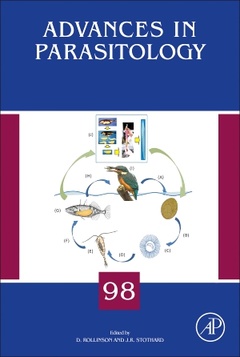Advances in Parasitology Advances in Parasitology Series
Directeurs de Collection : Rollinson David, Stothard Russell

Advances in Parasitology, Volume 98, first published in 1963, contains comprehensive and up-to-date reviews on all areas of interest in contemporary parasitology. The latest release in this series contains chapters on The battle against flystrike ? past research and new prospects through genomics, Life history, systematics and evolution of the Diplostomoidea Poirier, 1886: progress, promises and challenges emerging from molecular studies, Hook, line and infection: a guide to culturing parasites, establishing infections and assessing immune responses in the three-spined stickleback, and Trypanosoma congolense: a molecular toolkit and resources for studying a major livestock pathogen and model trypanosome.
The series includes medical studies of parasites of major influence, such as Plasmodium falciparum and trypanosomes. The series also contains reviews of more traditional areas, such as zoology, taxonomy, and life history, which help to shape current thinking and applications.
1. Measuring the Effect of Soil-Transmitted Helminth Infections on Cognitive Function in Children: Systematic Review and Critical Appraisal of Evidence Kei Owada, Mark Nielsen, Colleen L. Lau, Archie C.A. Clements, Laith Yakob and Ricardo J. Soares Magalhãe 2. Hook, Line and Infection: A Guide to Culturing Parasites, Establishing Infections and Assessing Immune Responses in the Three-Spined Stickleback Alexander Stewart, Joseph Jackson, Iain Barber, Christophe Eizaguirre, Rachel Paterson, Pieter van West, Chris Williams and Joanne Cable 3. Advances in Spermatological Characters in the Digenea: Review and Proposal of Spermatozoa Models and Their Phylogenetic Importance Abdoulaye J.S. Bakhoum, Jordi Miquel, Papa I. Ndiaye, Jean-Lou Justine, Alessandra Falchi, Cheikh T. Bâ, Bernard Marchand and Yann Quilichini 4. Life History, Systematics and Evolution of the Diplostomoidea Poirier, 1886: Progress, Promises and Challenges Emerging From Molecular Studies Isabel Blasco-Costa and Sean A. Locke 5. The Battle Against Flystrike –– Past Research and New Prospects Through Genomics Clare A. Anstead, Trent Perry, Stephen Richards, Pasi K. Korhonen, Neil D. Young, Vernon M. Bowles, Philip Batterham and Robin B. Gasser 6. Trypanosoma congolense: Molecular Toolkit and Resources for Studying a Major Livestock Pathogen and Model Trypanosome Wendy Gibson, Christopher Kay and Lori Peacock
Prof. Russell Stothard is Chair in Medical Parasitology at the Liverpool School of Tropical Medicine, UK
- Informs and updates on all the latest developments in the field of parasitology
- Includes medical studies of parasites of major influence, such as Plasmodium falciparum and trypanosomes<
- Contains contributions from leading authorities and industry experts
- Features reviews of more traditional areas, such as zoology, taxonomy, and life history, which help to shape current thinking and applications
Date de parution : 09-2017
Ouvrage de 322 p.
15x22.8 cm
Thème d’Advances in Parasitology :
Mots-clés :
Animal pathogen; Blow fly; Cercariae; Child development; Cognitive function measurement tools; Cognitive function; Cryptic species; Culture; Development; Digenea; Diplostomum; Diversity; Gasterosteus aculeatus; Genetic manipulation; Genome; Host-parasite relationship; Immunology; In vitro-culture; Infant; Infection; Infectious disease epidemiology; Intermediate host; Life cycle; Lucilia; Measuring health outcomes; Metacercaria; Molecular biology; Molecular prospecting; Neurological development; Neuropsychology; Parasitology; Phylogeny; Platyhelminthes; Prevention and control; Sampling effort; Soil-transmitted helminthiasis; Spermatozoon; Spermiogenesis; Stickleback; Sub-Saharan Africa; Systematics; Transcriptome; Transfection; Trypanosoma brucei; Trypanosoma congolense; Tsetse; Ultrastructure



